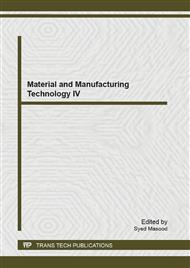[1]
ShuNong Zhang. Environmental Hydromechanics [M]. Nanjing: Hehai University Press, (1988).
Google Scholar
[2]
Min Tao and Xiaode Zhou. An iterative method of the inverse problem for the dispersion coefficient in water quality model [C]. Journal of Hydrodynamics. 2003, 18(5): 547-552.
Google Scholar
[3]
Guo Jianqing and Wen Ji. The linear graphic method for determining longitudinal dispersive coefficient of the streams by tracer test [J]. Environmental Science. 1989, 11(2): 24-27.
Google Scholar
[4]
CaiAn Huang. Linear regression method of the analysis of water-mass tracing experiment data in river [J]. Journal of Water Resources & Water Engineering. 1996, 7(4): 21-25.
Google Scholar
[5]
Gu Li, Hua Zulin, He Wei and Hu Yeliang. Routing-optimization method for determination of longitudinal dispersion coefficient in river [J]. Journal of Hydraulic Engineering. 2007, 38(12): 1421-1425.
Google Scholar
[6]
Zai Songmei, Guo Shulong and Wang Hong. Comparison of several methods calculating the longitudinal dispersion coefficient of a river [J]. Yellow River. 2008, 30(5): 20-21.
Google Scholar
[7]
Hu Guohua and Xiao Xiangqun. Experimental study by tracing on diffusion coefficients at heavy sediment-carrying reach of Yellow River [C]. Journal of Hydrodynamics. 2005, 20(6): 773-779.
Google Scholar
[8]
Huang Aizhu. Selection of longitudinal dispersion coefficient for Wuzhou reach at the downstream of Guijiang River [J]. Pearl River. 1992(6): 34-36.
Google Scholar
[9]
Hui Erqing. Experimental research on hydraulic character and pollutant diffusion among the vegetation community [D]. PhD dissertation of Tsinghua University. 2009, 4.
Google Scholar
[10]
Guo Jianqing. The application of nonlinear least square method to analyzing data of water mass tracer test of stream [J]. China Water & Wastewater. 1991, 7(5); 13-17.
Google Scholar
[11]
Zhang Jiangshan. Accelerated simplex algorithm to determine the longitudinal dispersion coefficient in a river by tracer test [J]. Environmental Science. 1993, 15(4): 66-68.
Google Scholar
[12]
Zhang Juanjaun and Wan Weifeng. The fast simulated annealing algorithm to determine the longitude dispersion parameters of river [J]. Ground water. 2005, 27(5): 396-398.
Google Scholar
[13]
Ma Haibo, Cui Guangbai and Chang Wenjuan. SVM algorithm for determination of river longitudinal dispersion coefficients [J]. Journal of Anhui Agricultural Sciences. 201038(23): 12630-12631.
Google Scholar
[14]
Guo Jianqing, Li Yan, Wang Hongsheng and Zhou HongFei. Application of particle swarm optimization algorithms to determination of water quality parameters of river streams [J]. Advances in Science and Technology of Water Resources. 2007, 27(6): 1-5.
Google Scholar
[15]
Meng LingQun and Guo Jianqing. Application of chaos particle swarm optimization algorithm to determination of water quality parameter of river stream [J]. Journal of Earth Sciences and Environment. 2009, 31(2): 169-172.
Google Scholar


